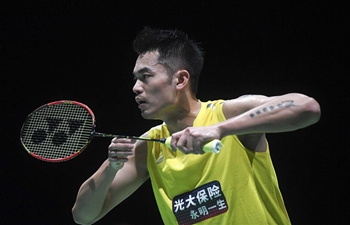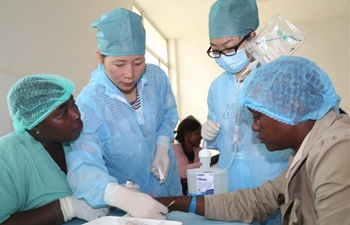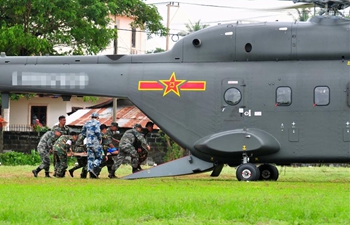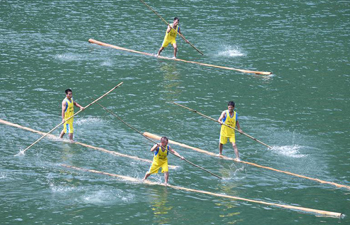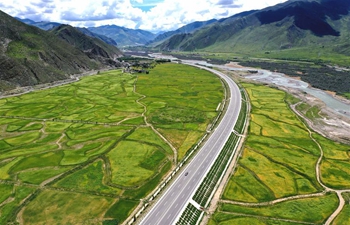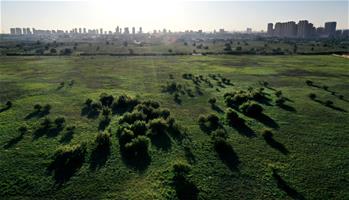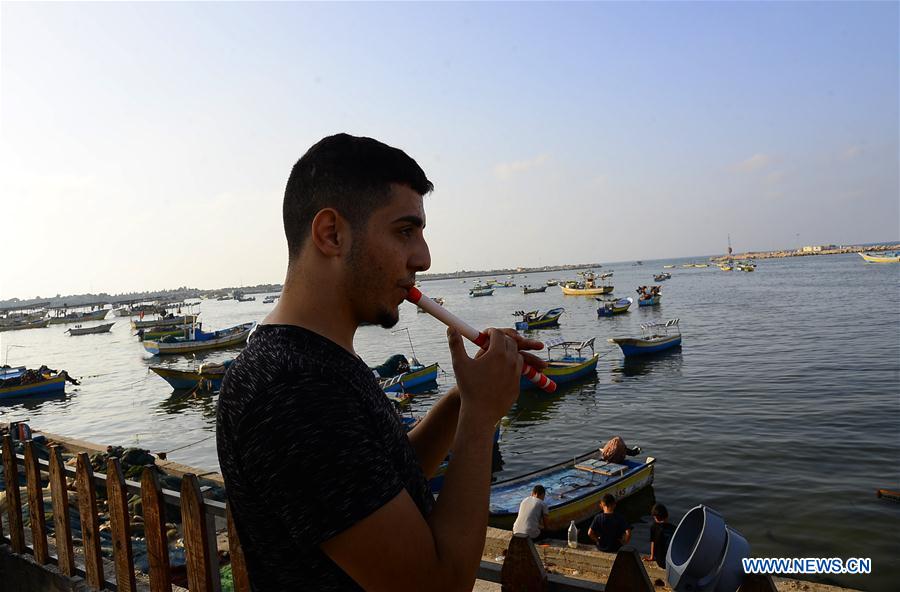
Iyad al-Kahlout, 22, plays the flute at Gaza port, in Gaza City, Aug. 5, 2019. The young man was injured on May 14, 2018, while he was participating in the Great March of Return to mark the anniversary of the Nakba Day. He was standing with his friend, and suddenly an Israeli soldier shot him, which severely injured his right leg. Later he turned his crutch into an instrument that he could play as a flute. (Xinhua/Stringer)
GAZA, Aug. 19 (Xinhua) -- Iyad al-Kahlout, 22, often goes to the sea before the sunrise and plays flute for hours, attracting a lot of passersby who gather around him.
While he was playing the flute, signs of comfort and joy appeared on the listeners' faces who applauded for him when he finished.
"For me, the music is also a medicine for the souls, especially for a disabled person," al-Kahlout told Xinhua.
The young man was injured on May 14, 2018, while he was participating in the Great March of Return to mark the anniversary of the Nakba Day.
He was standing with his friend, and suddenly an Israeli soldier shot him, which severely injured his right leg.
Following the incident, he underwent several reconstructive surgeries on his right leg in the besieged enclave, but because of his deteriorating health, he was transferred to Jordanian hospitals for treatment.
Al-Kahlout spent a long time in treatment, and the most difficult moment he faced was when the doctors told him that he will not walk without using crutches.
"I cried a lot and asked myself how will I continue my life as a disabled person who needs help forever," al-Kahlout said, adding that he got several psychological treatment to accept the reality.
"One day, I laid on my bed in the hospital and looked at my crutches. They looked like flutes and I caught one of them and turned it into an instrument that I could play it as a flute," he said.
"I was relaxed and felt better after playing the flute," he added.
After that, he used to play music by using his crutch. He took off the upper part of the crutch and kept the lower part, which seemed like a metal flute and played for the disabled people inside the hospital.
"I am playing music for peace, for our rights," the man said.
He added that "I participated in the Great March of Return to demand our rights, especially our right of living in peace on our lands," noting that their message will not stop even if they are wounded or dead.
According to the Gaza Health Ministry, more than 300 Palestinians were killed, and more than 17,000 others wounded, during their participation in the Great March of Return in the east of Gaza Strip, adding that thousands of the wounded people have become permanently disabled.
Experts and specialists of health told Xinhua that the large number of casualties, especially who were wounded in the lower parts of their bodies, prevent the medical staff to give them the adequate treatment as fast as they need, which requires hundreds of the patients to travel outside the Gaza Strip for treatment.
"The real crisis is post-injury, especially among amputees," Adnan al-Bursh, a consultant in orthopedic surgery at the Gaza Health Ministry told Xinhua, pointing out that most of them succumb to their psychological crisis and fail to accept the reality.
Al-Bursh added that "amputation cases are in dire need of psychological rehabilitation to accept the new situation," noting that his ministry is striving to provide various services according to its available capabilities under the difficult circumstances facing the residents of Gaza.
Doctors Without Borders (MSF), an international organization working in the Gaza Strip, provides medical and psychological assistance to people affected by the ongoing conflict in Gaza.
"On a daily basis, we receive a large number of injured people and provide them with the necessary medical services and medicines through our local and foreign staff who come to the Gaza Strip," Ayman Jaroushah, MSF's deputy in Gaza, told Xinhua.
Al-Kahlout went to MSF's headquarters to receive his treatment, and sat with his wounded colleagues to play them on his crutch.
"We are stronger than death and stronger than oppression. I am playing music for myself and for all of you, and to say that we are entitled to live in peace," he said.




